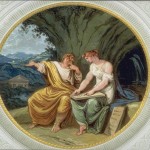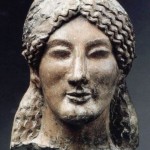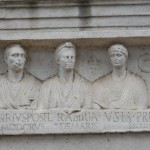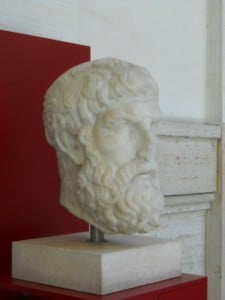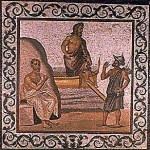Patheos is holding a sitewide series throughout June and July on “What do I really believe?” About a week ago I received an invitation to participate in the series, and read through the first set of suggested questions. The questions do not pertain to polytheistic traditions. The questions imply a dualistic world view, one that sees the world in terms of Good vs. Evil, with only one God contending against a Devil. There is really nothing in these questions that fostered dialogue between the various religious traditions represented on Patheos as they do not consider how other traditions perceive our universe.
The first question asked is “What does God really look like?”
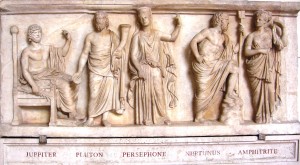
My first reaction was which particular God do you have in mind for I have met many? Are we to assume that all Gods look alike? And what about Goddesses? I suppose They could be a little pensive on how I might describe Their appearance, but are we to exclude all Goddesses from our consideration of what a God might look like? Do we also exclude all the 330 million manifestations of the divine in the traditions of India? Do we exclude all the other deities of all the religious traditions in Asia? Discount those of Africa and Australia? Should we not consider what the Slavonic Gods might look like? Or perhaps I should limit myself to only the thousand or so Gods and Goddesses named among the Romans? The question in itself sets limits on all possible answers when tries to conflate all deities down to only one God?
By the time I came upon the third question it was clear that the survey did not pertain either to my religious tradition or to my personal views, “Is there really a devil?” What devil? This question presupposes a dualistic world view imposed on the natural world which it defines in terms of Good contesting with Evil. It is a concept that conflicts with Nature and with science and that is contrary to Classical philosophy and to my own sensibilities. I cannot think to answer any of the questions without first offering something of my own conception of the greater Universe, which is composed of the physical universe, other possible universes, as well as the movement of the divine that binds all together in a Sympathetic Universe.
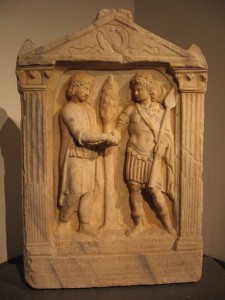
Looking above on a crisp cloudless night, the stars whirl in their multitude about Caelus. Crescent horned Luna slips beneath the horizon as every leaf, in every forest, whisper each other a goodnight. Wherever we look, whether into the depths of subatomic particles or into the depths of distant galaxies, what we find is a multiplicity of varied things which are each unique. Among the infinite upon infinite that is our universe, among all the universes that may form the cosmos, we, alone on this speck of a planet, ask from where has all this come?
In the face of such multiplicity as we witness every day, how can we assume that the origin of it all is not a multiplicity itself? What human hubris is it to presume that there is only one God? Or that such a divine entity who could give birth to our universe is not a Goddess?
Does everything resolve back to one First Cause or to one Primus Mobile? Even Plato did not accept that notion, for before the World Soul he posed as the Primus Mobile and before the First Cause that is The One That Is, Plato accepted the Pythagorean notion of The One as his God Over All. This is merely a human construct based more in our ignorance of how the universe exists than on any ability a human has to comprehend such an immense and all-inclusive concept. Aquinas grasped at this Platonist construct for two of his proofs of there being a God, but even his contemporaries pointed out that Aquinas had not gone far enough, that he had not continued to higher levels of existence than a demiurgic God. In fact, Aquinas had erroneously conflated Platonist views that saw the Gods and Goddesses as emanations arising naturally from a divine source, and the Demiurge resulting himself from a series of emanations. While Platonists taught that there is the One from which all else derive, they did not identify the One with the Demiurge as did Aquinas, nor did they see the universe as resulting from a deliberative creation.
“The World, we must reflect, is a product of Necessity, not of deliberate purpose: it is due to a higher Kind engendering in its own likeness by a natural process (Plotinus, Ennead 3.2 On Providence).”
Aristotle dismissed the concept of a demiurge. He did not believe that the universe was created but instead claimed that it was eternal. Epicureans saw the Gods and Goddesses assembling and dissolving themselves in the natural process whereby atoms cluster by unpredictable accident into molecules to form all things and then dissolve only to reform again into new things. The Goddesses and Gods were thus seen by Epicureans as having been born from Nature, and none are the creators of Nature. Rather than any single First Cause, the Epicureans hold to a multiplicity of causes, with no chain of events having been caused by an event that was not itself caused by another event. And then there were the Stoics whose notions about the divine Mind that formed all things from out of itself verges on the pantheistic. Each of these schools of philosophy would address this question differently, because their approach would differ from their respective perspectives of the Universe.
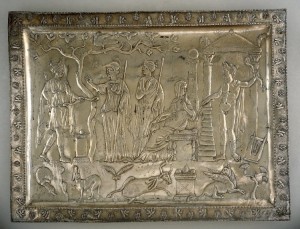
“What do I really believe?” I perceive a Universe encompassing both the physical universe and all possible universes together with the spiritual reality of the divine. It is a Universe of multiplicity, change, transformation, of many contrasts and many harmonies. It is a Universe in constant chaos and yet held together by Principles that bring order to its apparent disorder. In all of the chaotic events that occur around us, each cause and effect resulting from multiple chains of events in a universe of diverse multiplicities, nevertheless there is something enjoining all things, all forces, and all events together into a single universe. This is our physical universe. I accept, also, the possibility that other universes exist in a still greater cosmos. I cannot know for certain that other universes exist. It is not possible to comprehend anything so great as encompasses one universe, let alone a still greater something encompassing all universes. When I reflect on this, eliminating all else of which I cannot be certain, I arrive as Descartes had at the voice within. Cognito, ergo sum. But who then is this voice with whom I speak, who inside me addresses me? There is the conscious, reasoning mind with whom I identify myself and there is the other. The other is that Authentic Being, the divine within, that we call the Genius. And the divine within every woman and within every Goddess is called her Juno. Just as the conscious mind becomes aware of its surroundings through its senses, the Genius is aware of the divine that flows around it. For everything that exists participates in the divine; everything is imbued with the divine, and all are interconnected with all other things through the divine. The Genius is not separated from the flow of the divine when it comes into the body and generates Mind in its own likeness. It instead continually participates in the flow of the divine. Thus the Authentic Being within ourselves is joined with all other things that are imbued with the divine, and traveling along the lines of divinity between us and all else, our Genius attains a sense of the divine in Nature. From Nature are we thereby led back to the source of the divine.
There is, I believe, a continual flow of the divine downward and outward into all things in a diastolic motion and a return of the divine from all things in a systolic movement back to its source. This source of the divine is the Origin of all things, but I do not assume that Origin is but a single entity. In fact it is only reasonable to assume that the Origin is many things, both a beginning and an end, the same and the other, the one and the many, in an ever-changing, evolving continuum of an interconnection of the material and the spiritual. The divine flows as a river might, with its many currents crashing into each other, tumbling currents over one another, forming rapids and eddies along the way. In some things there is a greater volume of the divine than in other things. And thus I recognize not only that a multitude of Gods and Goddesses result from the flow of the divine, but also that different categories of deities exist on different planes of Being. The human Genius may be more powerful than the genius of an animal or a plant. Among plants some may hold a greater amount of divinity than others; that is to say that each plant is an expression of the divine in its own unique way. And every animal, and every rock, and every drop of rain participates in the divine, and thus are all things joined through the divine.
“First, then, the sky and lands and sheets of water,
The bright moon’s globe, the Titan sun and stars,
Are fed within by Spirit, and a Mind,
Infused through all the members of the World
Makes on great living body of the mass.”
~ Virgil, Aeneid VI, 973-977 trans. R. Fitzgerald.
As a result of the flow of the divine and the interconnection of all things in this continual movement of the divine my perception of the universe is that it is a Sympathetic Universe. It is not a linear universe with every event resulting from a series of causes that ultimately devolve from a first cause as Platonists hold. Rather it is a continuum of multiple causes and various series of events, at times converging, consuming, repelling one another; and where the Origin is both the beginning and end. It is not a universe which was created by some being exterior to itself, but it is instead a self-sufficient whole growing, learning, and constantly evolving. It is not a universe in which Good contests with Evil, since Nature is neither good nor evil. It is a varied and complex universe which is held together by a matrix of interconnecting lines of divinity. It is thus a Sympathetic Universe in that all within the whole are affected by whatever may occur in any part of it. Thus we can influence the universe as much as we are influenced by it, and we are all responsible, in some measure, for whatever our universe becomes.
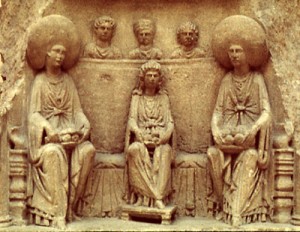
The massive outpouring of the divine, by which all things in the universe form in the loving embrace of Goddesses, has before and will again be returned in full by the Gods to the source of the divine. There was not just one Big Bang, but a series of conflagrations that led each time to a rebirth of our universe in yet another Big Bang. The cycle of creation and destruction is continual as in the dance of Shiva, gorging Himself on galaxies to create new, more splendid galaxies to come. In this process of conflagration and creation I see room for change, evolution of the entire Greater Universe as the divine within ourselves is fed back into the source, informing the divine of our collective experiences to influence its next creative expressions.
This perception of the Greater Universe colors my views on the Gods and Goddesses, on how we ought to approach Them and all beings in the universe around us, on how we ought to conduct ourselves as responsible and ethical individuals, why we exist presently, what purpose each of us have, and what shall happen as we evolve spiritually through many lives in the continuum.
When, therefore, you ask me “what does God really look like,” what I envision in my mind is not the face of any statue of a God or a Goddess, it is not an image invented by artistic expression. I recall the clear night sky so filled with stars and the sense of awe and fear welling up in me. I recall an amazing tree standing tall above all else around it. I recall the depth of a primordial forest and the height of mountains gleaming in the rising sun above shadowed valleys. I recall the flames of a fire dancing in the wind as it forms and reforms into many shapes, just as Heraclitus said the Gods manifest through many shapes from the divine Fire. What I “see” is not an image of a God or a Goddess, but an overwhelming sense of kratophany in Nature informing me of the divinities with Whom I am interconnected through the divine within myself.

